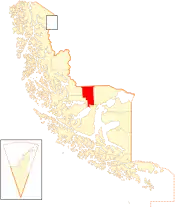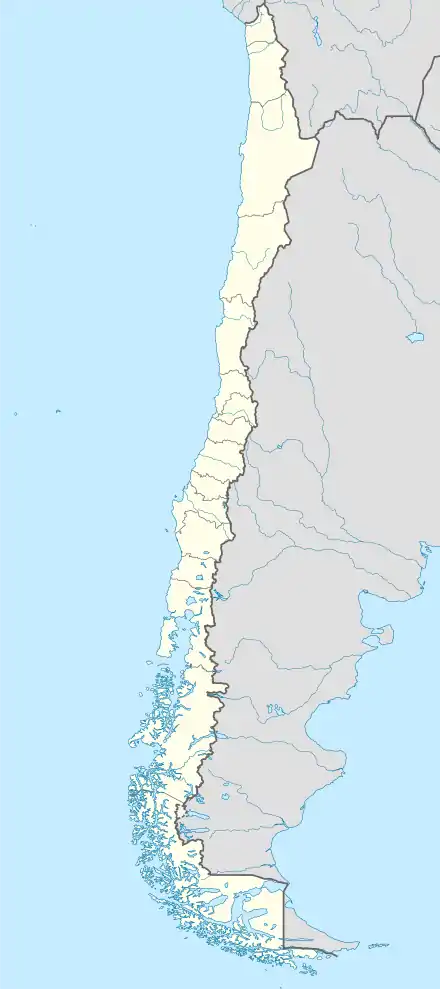Laguna Blanca, Chile
Laguna Blanca is a Chilean commune located in Magallanes Province and Region. The commune is administered by the municipality in Villa Tehuelches, that is the major settlement in the whole commune.
Laguna Blanca | |
|---|---|
%252C_Patagonia%252C_Morro_Chico.JPG.webp) Entering Morro Chico, the second largest settlement in the municipality of Laguna Blanca | |
 Location in the Magallanes y la Antártica Chilena Region  Laguna Blanca Location in Chile | |
| Coordinates (commune): 52°15′S 71°55′W | |
| Country | |
| Region | |
| Province | Magallanes |
| Government | |
| • Type | Municipality |
| • Alcalde | Ricardo Ritter Rodríguez (UDI) |
| Area | |
| • Total | 3,695.6 km2 (1,426.9 sq mi) |
| Elevation | 572 m (1,877 ft) |
| Population (2012 Census)[3] | |
| • Total | 208 |
| • Density | 0.056/km2 (0.15/sq mi) |
| • Urban | 0 |
| • Rural | 663 |
| Sex | |
| • Men | 563 |
| • Women | 100 |
| Time zone | UTC-4 (CLT [4]) |
| • Summer (DST) | UTC-3 (CLST [5]) |
| Area code(s) | 56 + 61 |
| Website | Municipality of Laguna Blanca |
Demographics
According to the 2002 census of the National Statistics Institute, Laguna Blanca spans an area of 3,695.6 km2 (1,427 sq mi) and has 663 inhabitants (563 men and 100 women), making the commune an entirely rural area. The population fell by 23.5% (204 persons) between the 1992 and 2002 censuses.[3]
Administration
As a commune, Laguna Blanca is a third-level administrative division of Chile administered by a municipal council, headed by an alcalde who is directly elected every four years. The 2012-2016 alcalde is Ricardo Ritter Rodríguez (UDI).[1][2]
Within the electoral divisions of Chile, Laguna Blanca is represented in the Chamber of Deputies by Juan Morano (PDC) and Gabriel Boric (Ind.) as part of the 60th electoral district, which includes the entire Magallanes y la Antártica Chilena Region. The commune is represented in the Senate by Carlos Bianchi Chelech (Ind.) and Carolina Goic (PDC) as part of the 19th senatorial constituency (Magallanes y la Antártica Chilena Region).
References
- "Asociación Chilena de Municipalidades" (in Spanish). Retrieved 27 January 2011.
- "Municipality of Laguna Blanca" (in Spanish). Retrieved 27 January 2011.
- "National Statistics Institute" (in Spanish). Retrieved 27 January 2010.
- "Chile Time". WorldTimeZones.org. Archived from the original on 2007-09-11. Retrieved 2007-05-05.
- "Chile Summer Time". WorldTimeZones.org. Archived from the original on 2007-09-11. Retrieved 2007-05-05.
External links
- (in Spanish) Municipality of Laguna Blanca
